5 key facts about this project
The project incorporates various unit types, including studio, one-bedroom, two-bedroom, and three-bedroom apartments. This range addresses the requirements of different demographics, enhancing inclusivity in housing. Common spaces are integrated within the design, facilitating interaction and community engagement among residents.
Sustainable design principles are evident through the use of materials and green elements. The incorporation of vertical gardens and natural light enhances the living experience. Traditional brick is utilized for its durability and warmth, while metal panels add a contemporary touch. Glass features throughout the building maximize transparency, connecting residents to their surroundings.
Community-Centric Design
What distinguishes this project from others is its emphasis on community-centric living. The integration of common areas is a key feature, designed to foster social interaction among residents. These spaces are strategically located to promote engagement, allowing individuals to cultivate relationships within the building.
The vertical circulation system further enhances the community aspect by providing access to light-filled areas that encourage mingling. Additionally, the lattice work of greenery on the building facade serves not only an aesthetic purpose but also contributes to the ecological health of the urban environment. This innovative approach to integrating nature within the living space sets the project apart from conventional housing developments.
Sustainable and Flexible Living Solutions
The use of modular construction allows for a flexible design that can adapt over time. Each unit can be customized according to the changing needs of residents. As lifestyles evolve, the project accommodates modifications without significant structural changes. This adaptability promotes long-term sustainability in urban living.
Overall, "Affordable Modular Typology" embodies a thoughtful approach to architecture by addressing functional housing needs while fostering a vibrant community atmosphere. The project invites further exploration of its architectural plans, sections, designs, and ideas to gain a comprehensive understanding of these innovative solutions to contemporary urban housing challenges.























